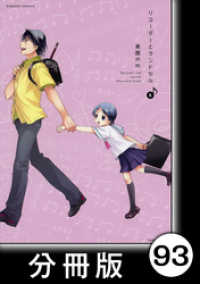Full Description
How can librarianship be liberatory? How does librarianship help people to be free? How is library capacity and expertise used to increase freedom, justice, and community? This invigorating collected volume from Core unpacks these questions, and many others besides, to reveal the many ways that library workers and their institutions are applying skills, knowledge, abilities, professional ethics, and personal commitment to practice liberatory librarianship. These examples will serve as guideposts and inspiration for readers undertaking their own efforts. With a special emphasis on the voices of non-white practitioners, the themes and stories explored in this volume include
histories of several liberatory efforts, such as the Digital Library of the Caribbean's (dLOC) open access repository of Caribbean and circum-Caribbean resources, restorative justice at the UK's SOAS Library, and examples of unsiloing DEI work;
the work of visionary, liberatory librarians such as Dr. Alma Jordan, Lillian Marrero, Rosa Quintero Mesa, and Judith Rogers;
innovative programs such as those at Oakland Public Library and Stanford University's KNOW System Racism Project;
library instruction for college students with intellectual and developmental disabilities and a liberatory archival training program; and
the radical and liberatory power of empathy in librarianship for imagining and enacting change.
Contents
Introduction
Part I: Liberatory Librarians Chapter 1: Dr. Alma Jordan
Shamin Renwick
Chapter 2: Lillian Marrero: Sanctuary and Solidarity through Libraries
Tania MarÍa RÍos Marrero
Chapter 3: Rosa Quintero Mesa: The University of Florida's Liberatory Librarianship Defied Global Politics
Richard Phillips
Chapter 4: Judith Rogers: Visionary and Organic Leader
Laurie Taylor
Part II: Programs That Support Liberation
Chapter 5: Liberatory Librarianship in a Public Library
Brian Boies
Chapter 6: The KNOW Systemic Racism Project at Stanford University
Felicia A. Smith
Part III: The Personal as Professional
Chapter 7: My Brother's Keeper
Tiffany Grant, LaWanda Singleton, and Clementine Adeyemi
Chapter 8: Disabled in the Library
JJ Pionke
Part IV: Histories of Liberation
Chapter 9: Elevating Diverse Voices in Service of Liberatory Librarianship
Willa Liburd Tavernier, Ursula Romero, and Christina Jones
Chapter 10: Unsiloed, Cross-Jurisdictional DEI
Tiffany J. Grant, Mikaila Corday, Michelle McKinney, Margaux Patel, Eira Tansey, and June Taylor-Slaughter
Chapter 11: Hidden Histories and Radical Reading Lists: Restorative Justice at SOAS Library
Farzana Qureshi and Ludi Price
Part V: Liberatory Instruction and Training
Chapter 12: "We Are . . . Library Users!": Developing a Liberatory Library Instruction Program for College Students with Intellectual and Developmental Disabilities
Bernadette A. Lear
Chapter 13: Critical Reflections on the University of Kentucky's Basic Archives Workshop: Status Quo or Transformation?
Sarah Dorpinghaus and Ruth E. Bryan
Part VI: Imaging and Enacting Liberation Together
Chapter 14: Empathy as Resistance? The Concept of Empathy in Liberatory Librarianship
Sabine Jean Dantus
Appendix: Acronyms
About the Editors and Contributors
Index
-

- 電子書籍
- 君に一生を捧げる【タテヨミ】第42話 …
-

- 電子書籍
- GOLF TODAY 2019年5月号
-

- 電子書籍
- 愛を忘れた氷の女王【ハーレクイン・セレ…
-

- 電子書籍
- リコーダーとランドセル【分冊版】93 …
-

- 電子書籍
- LANDSCAPE DESIGN No…



